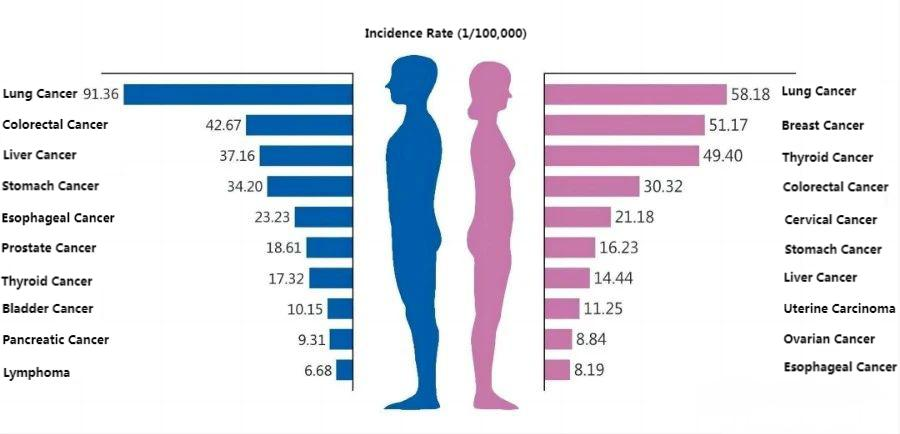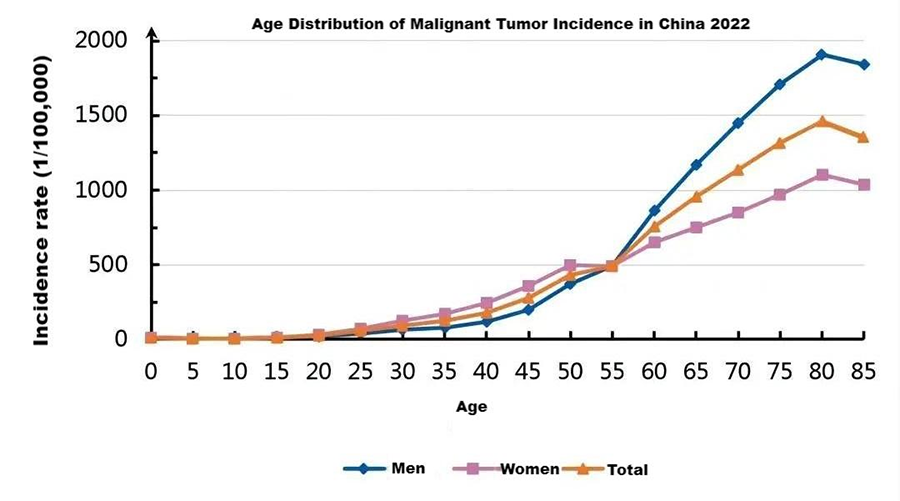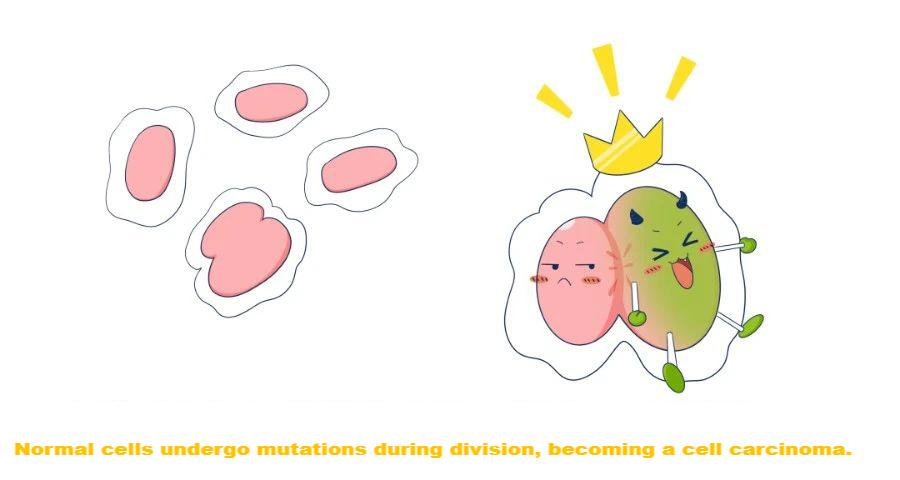1.Why is it necessary to do gastroenteroscopy?
As the pace of life and eating habits change, the incidence of gastrointestinal diseases has also changed. The incidence of gastric, esophageal and colorectal cancers in China is increasing year by year.

Gastrointestinal polyps, early gastric and intestinal cancers basically have no specific symptoms, and some even have no symptoms in the advanced stage. Most patients with gastrointestinal malignant tumors are already in the advanced stage when diagnosed, and the prognosis of early-stage and advanced-stage tumors is completely different.
Gastroenteroscopy is the gold standard for detecting gastrointestinal diseases, especially early-stage tumors. However, due to people's lack of understanding of gastrointestinal endoscopy, or listening to rumors, they are unwilling or afraid to undergo gastrointestinal endoscopy. As a result, many people have lost the opportunity for early detection and early treatment. Therefore, "asymptomatic" gastrointestinal endoscopy inspection is necessary.
2. When is a gastroenteroscopy necessary?
We recommend that the general population over the age of 40 routinely complete gastrointestinal endoscopy. In the future, gastrointestinal endoscopy can be reviewed in 3-5 years based on the examination results. For those who usually have various gastrointestinal symptoms, it is recommended to have a gastrointestinal endoscopy at any time. If there is a family history of gastric cancer or intestinal cancer, it is recommended to start the gastroenteroscopy follow-up in advance to 30 years old.
3. Why is 40 years old?
95% of gastric cancers and colorectal cancers evolve from gastric polyps and intestinal polyps, and it takes 5-15 years for polyps to evolve into intestinal cancer. Then let’s look at the turning point in the age of onset of malignant tumors in my country:

From the chart we can see that the incidence of malignant tumors in our country is relatively low at the age of 0-34, increases significantly from the ages of 35 to 40, is the turning point at the age of 55, and reaches a peak around the age of 80.

According to the law of disease development, 55 years old - 15 years old (colon cancer evolution cycle) = 40 years old. At the age of 40, most examinations only detect polyps, which are removed and reviewed regularly and will not progress to intestinal cancer. To take a step back, even if turns into cancer, it is very likely to be early-stage cancer and can be cured completely under colonoscopy.
This is why we have been urged to pay attention to the early screening of digestive tract tumors. A timely gastrointestinal endoscopy can effectively prevent gastric cancer and intestinal cancer.
4.What is better for normal and painless gastroenteroscopy? What about the fear check?
If you have poor tolerance and cannot overcome your psychological fear and are afraid of endoscopy, then choose painless; if you have no such troubles, you can choose normal.
Ordinary gastrointestinal endoscopy will cause some discomfort: nausea, abdominal pain, bloating, vomiting, numbness of limbs, etc. However, under normal circumstances, as long as they are not overly nervous and cooperate well with the doctor, most people can tolerate it. You can evaluate yourself. For those who cooperate well, ordinary gastrointestinal endoscopy can achieve satisfactory and ideal examination results; however, if excessive tension leads to poor cooperation, the examination results may be affected to a certain extent.
Painless gastroenteroscopy: If you are really scared, you can choose a painless gastrointestinal endoscopy. Of course, the premise is that it must be evaluated by a doctor and meet the conditions for anesthesia. Not everyone is suitable for anesthesia. If not, then we can only endure it and do ordinary ones. After all, safety comes first! Painless gastrointestinal endoscopy will be relatively more leisurely and detailed, and the difficulty of the doctor's operation will also be greatly reduced.
5. What are the advantages and disadvantages of painless gastrointestinal endoscopy?
Advantages:
1.No discomfort at all: you are sleeping during the whole process, not knowing anything, just having a sweet dream.
2.Less damage: because you won’t feel nauseated or uncomfortable, the chance of damage caused by the mirror is also much smaller.
3.Observe carefully: When you are sleeping, the doctor will no longer worry about your discomfort and will observe you more calmly and carefully.
4.Reduce risk: because ordinary gastroscopy will cause irritation, blood pressure, and heart rate will suddenly increase, but it is painless no need to worry about this trouble anymore.
Shortcoming:
1.Relatively troublesome: compared with ordinary gastrointestinal endoscopy, there are some additional special preparation requirements: electrocardiogram examination, an indwelling injection needle is required before the examination, family members must be accompanied, and you cannot drive within 1 day after the examination, etc.
2.It's a bit risky: after all, it's general anesthesia, the risk is higher than ordinary. You may experience drops in blood pressure, difficulty breathing, accidental inhalation, etc.;
3.Dizziness after doing it: although you don’t feel anything at all while doing it, you will feel dizzy after doing it, just like being drunk, but of course it won’t last long;
4.A bit expensive: compared with ordinary gastrointestinal endoscopy, the price of painless is slightly higher.
5.Not everyone can do it: painless examination requires anesthesia evaluation. Some people cannot undergo painless examination, such as those with a history of allergies to anesthesia and sedative drugs, those with bronchitis with excessive phlegm, those with a lot of residues in the stomach, and those with severe People with snoring and sleep apnea, as well as those who are overweight should be cautious, people with heart and lung diseases who cannot tolerate anesthesia, patients with glaucoma, prostatic hyperplasia and a history of urinary retention, pregnant and lactating women should be cautious.
6. Will anesthesia for painless gastrointestinal endoscopy make people silly, memory loss, affect IQ?
No need to worry at all! The intravenous anesthetic used in painless gastrointestinal endoscopy is propofol, a milky white liquid that doctors call "happy milk". It metabolizes very quickly and will be completely decomposed and metabolized within a few hours without causing accumulation. . The dosage used is determined by the anesthesiologist based on the patient's weight, physical fitness and other factors. Basically, the patient will wake up automatically in about 10 minutes without any sequelae. A small number of people will feel like they are drunk, but very few people will wake up automatically. It will disappear soon.
Therefore, as long as it is operated by professional doctors in regular medical institutions, there is no need to worry too much.
5.Are there any risks with anesthesia?
The specific situation has been explained above, but no clinical operation can be guaranteed to be 100% risk-free, but at least 99.99% can be successfully performed.
6.Can tumor markers, blood drawing, and fecal occult blood tests replace gastrointestinal endoscopy?
Cannot! Generally, gastrointestinal screening will recommend a fecal occult blood test, four gastric function tests, tumor markers, etc. They each have their own uses:
7.Fecal occult blood test: the main purpose is to check for hidden bleeding in the gastrointestinal tract. Early tumors, especially microcarcinomas, do not bleed in the early stage. Fecal occult blood continues to be positive and requires great attention.
8.Gastric function test: the main purpose is to check gastrin and pepsinogen to determine whether secretion is normal. It is only to screen whether people are at high risk of gastric cancer. If abnormalities are found, gastroscopy review must be performed immediately.
Tumor markers: It can only be said that it has a certain value, but it must not be used as the only reference for screening tumors. Because some inflammation can also cause tumor markers to rise, and some tumors are still normal until they are in the middle and late stages. Therefore, you don’t have to be afraid if they are high, also you can’t ignore them if they are normal.
9. Can capsule endoscopy, barium meal, breath test, and CT replace gastrointestinal endoscopy?
It is impossible! The breath test can only detect the presence of Helicobacter pylori infection, but cannot check the condition of the gastric mucosa; the barium meal can only see the "shadow" or outline of the gastrointestinal tract, and its diagnostic value is limited.
Capsule endoscopy can be used as a means of initial screening. However, due to its inability to attract, rinse, detect, and treat, even if a lesion is detected, conventional endoscopy is still required for secondary process, which is expensive to afford.
CT examination has certain diagnostic value for advanced gastrointestinal tumors, but it has poor sensitivity for early cancer, precancerous lesions, and general benign diseases of the gastrointestinal tract.
In a word, if you want to detect early gastrointestinal cancer, gastrointestinal endoscopy is irreplaceable.
10. Can painless gastrointestinal endoscopy be done together?
Yes, it should be noted that before the examination, please inform the doctor proactively and complete the electrocardiogram examination for anesthesia evaluation. At the same time, a family member must accompany you. If a gastroscopy is done under anesthesia and then a colonoscopy is performed, and if it is done together with a painless gastrointestinal endoscopy, It only costs to get anesthesia once, so it also costs less.
11. I have a bad heart. Can I do gastroenteroscopy?
This depends on the situation. Endoscopy is still not recommended in the following cases:
1.Severe cardiopulmonary disorders, such as severe arrhythmias, myocardial infarction activity period, severe heart failure and asthma, people with respiratory failure who cannot lie down, unable to tolerate endoscopy.
2.Patients with suspected shock and unstable vital signs.
3.Persons with mental illness or severe intellectual disability who cannot cooperate with endoscopy (pain-free gastroscopy if necessary).
4.Acute and severe throat disease, where endoscope cannot be inserted.
5.Patients with acute corrosive inflammation of esophagus and stomach.
6.Patients with obvious thoracoabdominal aortic aneurysm and stroke (with bleeding and acute infarction).
7.Abnormal blood coagulation.
12. What is the biopsy? Will it cause damage to the stomach?
Biopsy is to use biopsy forceps to remove a small piece of tissue from the gastrointestinal tract and send it to pathology to determine the nature of the gastric lesions.
During the biopsy process, most people don’t feel anything. Occasionally, they feel like their stomach is being pinched, but there is almost no pain. The biopsy tissue is only the size of a grain of rice and causes very little damage to the gastric mucosa. Moreover, after taking the tissue, the doctor will stop the bleeding under a gastroscopy. As long as you follow the doctor's instructions after the examination, the probability of further bleeding is very low.
13. Does the need for biopsy represent cancer?
Not really! Taking a biopsy does not mean that your illness is serious, but that the doctor takes out some of the lesion tissue for pathological analysis during gastroenteroscopy. For example: polyps, erosions, ulcers, bulges, nodules, and atrophic gastritis are used to determine the nature, depth, and scope of the disease to guide treatment and review. Of course, doctors also take biopsies for lesions suspected to be cancerous. Therefore, biopsy is only to assist gastroenteroscopy diagnosis, not all lesions taken from biopsy are malignant lesions. Don’t worry too much and just wait patiently for the pathology results.
We know that many people’s resistance to gastrointestinal endoscopy is based on instinct, but I really hope you can pay attention to gastrointestinal endoscopy. I believe that after reading this Q&A, you will have a clearer understanding.
We, Jiangxi Zhuoruihua Medical Instrument Co.,Ltd., is a manufacturer in China specializing in the endoscopic consumables, such as biopsy forceps, hemoclip, polyp snare, sclerotherapy needle, spray catheter, cytology brushes, guidewire, stone retrieval basket, nasal biliary drainage catheter etc. which are widely used in EMR, ESD, ERCP. Our products are CE certified, and our plants are ISO certified. Our goods have been exported to Europe, North America, Middle East and part of Asia, and widely obtains the customer of the recognition and praise!
Post time: Apr-02-2024


